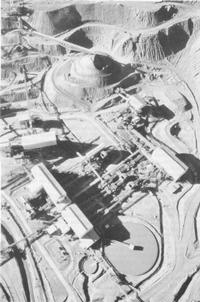


Chapter 10
I 1. Introduction
II 2. The Role Of Technology
III 3. Some Highlights Of Australian Minerals Technology
i Gold
ii Copper
iii Lead-zinc-silver
iv Technology in iron ore mining
v Iron and steel technology
vi Nickel
vii Mineral sands
viii Bauxite, alumina, aluminium
IV 4. Other Technological Achievements (in brief)
V 5. Export Of Technology
VI 6. Education And Research
VII 7. The Scientific Societies
VIII 8. Conclusion
References
Index
Search
Help
Contact us

A significant technological development of the late 1970s was the application in the Pilbara of advanced process technology (principally developed in the diamond mines of South Africa) to the upgrading of otherwise unsaleable low grade ore (e.g. less than 60 per cent Fe). This has permitted significant extensions to the total ore reserves at two existing mines (Newman and Hamersley). The principal process involved (heavy medium separation) utilizes the difference in specific gravity between the heavy hematite mineral and the lighter shaley contaminant to effect the separation. Alumina levels of approximately 4.5 per cent in the low grade feed are reduced to the order of 2.3 per cent in products.

Goldsworthy Mining has advanced plans (1987) to apply gravity separation techniques of jigging and cone concentration to lower grade ore adjacent to existing mining areas.
Over-riding the specific introduction of new technology has been the almost awe-inspiring rates of development and application of computers, especially personal computers. Mine and geological planning, maintenance planning, technical, commercial and personnel data manipulation and recording, communications, PLC systems in the operations, diagnostic applications and so on have all received a major fillip by the use of computers -the future applications are almost inconceivable.
In a developing industry the rate of implementation and the number of applications have been relatively high as new techniques and applications became available. Until major breakthroughs and innovations are introduced to iron and steel making technology it can be assumed that overall progress will continue to be steady rather than spectacular as the industry consolidates into a more mature phase commensurate with the current market and economic situations.
Organisations in Australian Science at Work - CSIRO; Goldsworthy Mining Associates; Hamersley Iron; Mount Newman Mining Co. Pty Ltd; Mount Tom Price Mine, W.A.
 |
Australian Academy of Technological Sciences and Engineering |  |
© 1988 Print Edition pages 757 - 758, Online Edition 2000
Published by Australian Science and Technology Heritage Centre, using the Web Academic Resource Publisher
http://www.austehc.unimelb.edu.au/tia/721.html